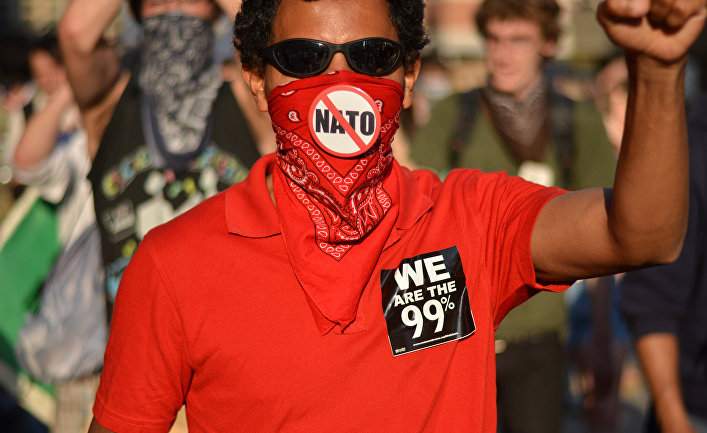This issue was addressed in an article by Vuk Draskovic in the daily newspaper "Today". Once upon a time, the head of the SPO was called the "king of Serbian squares," "the first true opposition" and "the only alternative to the communist system".
Certain meetings were as much about Vuk followers as it was about serious issues. To rhyme, and to simultaneously provoke. At the time, the wolf spoke with great style and gathered the masses in the churchyard, where he spoke about the state, nation, national interests, and Serbian identity.
Unfortunately, the lone wolf was lost in the (political) forest. There has been no mention of the struggle for Serbian interests. It's been hard to read his articles in recent years. You can see that it is an annoyance made to it. However, regardless of who wrote it, they have a function. Behind these articles only a few slogans for public exploitation remain, in which issues surrounding NATO troops are repeated endlessly.
What are the arguments justifying the need for rapid entry into NATO? First, it is already a worn-out story about this investment. In Serbia everything will flourish only when we join NATO. Examples of other Eastern European countries are not mentioned. A simple comparison can clearly see that there are some exaggerated links between NATO membership and economic growth. There are numerous examples to the contrary, however. In Croatia, after joining NATO there was an economic downturn. And that's important to note. Bulgaria and Romania stagnated. Albania is the only success story. Economic growth has to do with a number of other things, but not with joining NATO. With regard to the situation in the EU, membership in this organization does not guarantee a certain economic future.
The second thesis is that NATO is "the guarantor of political certainty," and the third is already old, and has been repeated countless times: if Serbia joins NATO, it will work with others to solve regional problems, as in- “one hand will wash the other”. Or, as Draskovic likes to say: "Either we will be at the table, or on the menu." One answer is to set out two interconnected thesis, concerning the way that NATO functions.
Some time ago, the historian Predrag Markovic answered Vuk with a metaphor: If it is difficult for Serbia to sit at the table, Serbia could play the role of a waiter! And this is an excellent description of the circumstances within NATO. This organization has been masterfully managed by the United States. Often decisions are made in consultation with its closest ally, Great Britain (although the UK does not always support the war plans of Washington), and almost always can count on the support of Canada and this is the first group within NATO, the core of this organization. In the second group are significant European countries: France, Germany, Italy, Poland, Spain and Turkey. These countries may, to some degree, protect their interests within NATO, and are capable of and to define their own goals and withstand the pressures of the United States when it is in their interest. That the US is still in Iraq has proven that they intervene even if they have problems with the countries in this group, although usually they are looking to solve all disputes and to some extent take into account the European partners.
The third group includes all the others, a characteristic of these states is to be completely militarily and politically dependent on the United States. Washington, in fact, has used them as a counterweight to the countries in the second group, when they attempt to come out with opinion. This is what is going on when you hear that an initiative of Germany and France, which was essentially directed against the interests of the United States, was supported by Lithuania, Romania and Portugal. Members of NATO, viewed from the perspective of the United States, are obliged to follow Washington’s orders. Now, whether it's in Iraq, Libya and Ukraine, it does not matter. This would be the fate of Serbia. In these circumstances, the only certainty is that it must follow US foreign policy. Bulgarians have beautifully demonstrated what happens when there is a conflict between American and Bulgarian interests.
They, of course, gave up of Bulgarian interests. And they had to give up on the "South Stream" pipeline and the "Belene" nuclear power plant. So now energy will have to be imported from the US. Tankers! NATO in Eastern Europe is the US’s only instrument to create a regional security complex in which they will operate. There is no dinner nor menu. Sure, follow US foreign policy and participate in their interventions and missions around the world at a cost, which is the thing that everybody forgets. Our tax money would go to "establishing democracy" in Libya.
Finally, Draskovic has concluded that the biggest obstacle to NATO is the constitutional preamble, which is contrary to reality. This requires no special comment, except the conclusion that we should pay attention to the many "inconsistencies with reality." In particular, the processes taking place in international politics and the global political system. The West no longer has the power to govern the entire world, and therefore NATO can not be transformed into a "world policeman". A major crisis in which we live is just a consequence of incompliant wish of the US and its European allies on the one hand, and real places on the global stage, in the other. Why should Serbia participate in their war, which is trying to defend the indefensible? Why should we be a generator of new crises and provoke new wars? And yet it will all be financed from our own pocket? Will we do this to forgive, perhaps because the United States bombed us?






